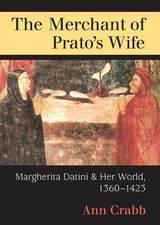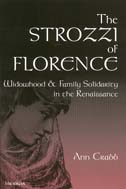2 books about Crabb, Ann Morton

The Merchant of Prato's Wife
Margherita Datini and Her World, 1360-1423
Ann Crabb
University of Michigan Press, 2015
Although the fourteenth-century Italian merchant Francesco Datini has received attention from business historians, there has previously been no full study of his wife, Margherita Datini. Drawing on a sizable trove of Margherita’s correspondence held in the Archivio di Stato di Prato, including hundreds of letters she exchanged with Francesco, Ann Crabb investigates the social and economic importance of women’s roles as wives and mothers, early modern European views on honor, and the practice of letter writing in Margherita’s world.
Margherita’s often colorful comments demonstrate her attitudes toward her rather unhappy marriage and her inability to have children, along with other aspects of her life. Her letters reveal the pride she felt in carrying out her many responsibilities as a wife and, later, a widow: in scribal letter writing, in business, in household management, and in farming. Crabb emphasizes that the role of a wife was a recognized social position, beyond her individual relations with her husband, and provided opportunities beyond what restrictive laws or restrictive views of female honor would suggest. Further, Crabb considers Margherita’s successful efforts, on her own initiative and in her late thirties, to learn to read and write at a literate level.
This book will be of interest to both scholars and general readers of women’s history. In addition, historians of early modern Italy and, more generally, of early modern Europe will find this book valuable.
[more]

The Strozzi of Florence
Widowhood and Family Solidarity in the Renaissance
Ann Crabb
University of Michigan Press, 2000
In 1434, the new Medici government exiled Matteo Strozzi as an enemy of the regime. Soon afterwards, Matteo and three of his eight children died of the plague. His young widow, Alesandra, struggled to make arrangements for her five remaining children, preparing her sons for merchant careers and finding husbands for her daughters. Her three sons left Florence in the 1440s to enter relatives' merchant banking firms. Their absence, prolonged by a sentence of exile imposed on them in 1458, gave rise to the family correspondence that informs this rich study.
The Strozzi correspondence tells the story of the decline and recovery of one Florentine patrician family. Eventually, the Strozzi brothers earned the greatest fortune of their era, and, after the repeal of their exile, Filippo, the eldest, most successful, and longest lived, spent the last years of his life in Florence as one of its foremost citizens. Set in the context of other documentary evidence and of modern historical and anthropological studies, Crabb's study illuminates the role of women, kinship, solidarity, honor, and profit. These letters provide nuanced insights into values and practices that more impersonal sources cannot rival.
As well as appealing to those interested in the Renaissance, Florence, and Italy, this book will attract those wanting to read about topics in social history that cross time periods: women, family and kinship, business, and honor. It confronts issues of Renaissance Florentine historiography by presenting a more positive view of the role of women than does current orthodoxy, by providing evidence of the impact of extended kinship ties, a controversial issue, and by illuminating further the value placed on honor and profit.
Ann Crabb teaches medieval history at James Madison University.
The Strozzi correspondence tells the story of the decline and recovery of one Florentine patrician family. Eventually, the Strozzi brothers earned the greatest fortune of their era, and, after the repeal of their exile, Filippo, the eldest, most successful, and longest lived, spent the last years of his life in Florence as one of its foremost citizens. Set in the context of other documentary evidence and of modern historical and anthropological studies, Crabb's study illuminates the role of women, kinship, solidarity, honor, and profit. These letters provide nuanced insights into values and practices that more impersonal sources cannot rival.
As well as appealing to those interested in the Renaissance, Florence, and Italy, this book will attract those wanting to read about topics in social history that cross time periods: women, family and kinship, business, and honor. It confronts issues of Renaissance Florentine historiography by presenting a more positive view of the role of women than does current orthodoxy, by providing evidence of the impact of extended kinship ties, a controversial issue, and by illuminating further the value placed on honor and profit.
Ann Crabb teaches medieval history at James Madison University.
[more]
READERS
Browse our collection.
PUBLISHERS
See BiblioVault's publisher services.
STUDENT SERVICES
Files for college accessibility offices.
UChicago Accessibility Resources
home | accessibility | search | about | contact us
BiblioVault ® 2001 - 2024
The University of Chicago Press









